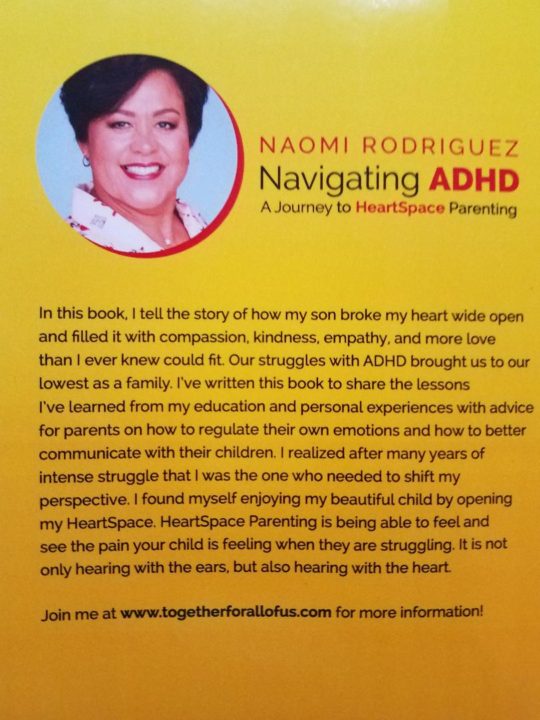When my child was not who I dreamed he would be, how I had to let go of that dream. That is the topic of this interview when Yulia Rafailova and Naomi Rodriguez sit down to talk about the child you have vs. the child you dreamed you would have.
Check out The Power of Purpose podcast. I sit down with Judy Carter to talk ADHD and my book Navigating ADHD my journey to Heartspace Parenting. How I went from mess to success!

What does it mean to have a child diagnosed with ADHD?
What does it mean to have a child diagnosed with ADHD? What is the impact of this diagnosis to the child and his or her family? ADHD is not only a behavioral emotional disorder; ADHD is also considered a learning disability. I would like to review my experience with my son and all the different ways he has struggled. Looking back on it now, my son looked like a child that was struggling with his environment. It appeared that he had significant behavioral issues, such as not listening, talking back, and physical aggression. His school and home life were in total chaos. He started struggling around three years old in preschool. In first grade the situation got worse with a bigger school. In addition, the forty-minute bus ride to and from school proved to be another challenge to his behavior. The school would send him out of the classroom to the office.
He was not able to access the curriculum. This had a tremendous impact on his educational development. In order to solve the problem, I enlisted the services of an educational advocate to guide us in navigating the school system. The advocate recommended a psychological educational testing. The costs for the testing and subsequent therapies were significant. Some of these costs were satisfied through insurance; however the majority was paid personally.
I also proceeded to improve my knowledge of ADHD. I attended educational classes and joined parental support groups. In total I did whatever I could to support him. I want to say that I feel blessed to have been able to find the correct support for him. Our situation is a work in progress but we have more good days than bad days. I have also realized that coping with my child’s situation taught me valuable lessons about unconditional love, compassion, empathy, respect, trust and honesty.
I look forward to sharing my story with others. My experience is that the mental behavioral health of children is in crisis right now this is a silent epidemic with one in five being diagnosed with ADHD.
Many of our troubled young people are growing up in correctional facilities and group homes. It was recently discovered that eighty percent of men incarcerated have struggled with some form of learning disability. Having a learning disability leads to difficulty in emotional control. This in turn leads to anti-social behavior. This behavior is the child’s way of communicating that the challenge of the educational environment is overwhelming!
According to The National Institute of Mental Health Attention-deficit/hyperactivity disorder (ADHD) is one of the most common childhood disorders being diagnosed at the present time. ADHD can continue through adolescence and into adulthood. Symptoms include difficulty staying focused and paying attention, difficulty controlling behavior, impulse control and hyperactivity (over-activity).
According to Learning Disabilities of America fifty to seventy percent of children with ADHD also struggle with some form of learning disabilities. Complex learning disabilities that have to do with the way they receive, process and articulate information.
Here are some of the many learning disabilities an ADHD child can struggle with: Auditory Processing Disorder, Dyscalculia, Dysgraphia, Dyslexia, Dyspraxia, Language Processing Disorder, Visual Perceptual/Visual Motor Deficit, working memory, Non-Verbal Learning Disabilities, and impaired Executive Function (the ability to cope with the challenges of everyday life). Children with ADHD also tend to be around three years behind in emotional growth and seem to be more sensitive emotionally. They get their feelings hurt easily or they get angry quickly.
ADHD is complex to diagnose and even more complicated to treat but with the right support and guidance these children can be successful adults.
ADHD left untreated or not treated correctly can lead to a life of problems with family, alcohol and drugs, teenage pregnancy, high risk behavior, crimes, incarceration, homelessness and sometimes even death.
Let’s make a difference and Bring Awareness to this Silent Epidemic. Children are suffering because parents are suffering!
Sincerely,
Naomi Rodriguez
323-688-0765
Navigating ADHD my journey to HeartSpace Parenting
Video – Young Adults are struggling with Mental and/or Behavioral health issues unable to control their emotions and the different feelings they are struggling with.
Talking to 12 to 14 years old about being Kind
Must Watch!
https://www.facebook.com/TheHumorLAD/videos/1924938087769311/

